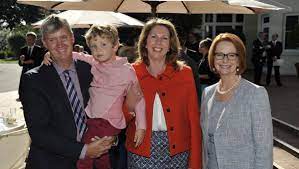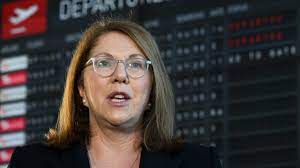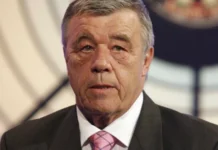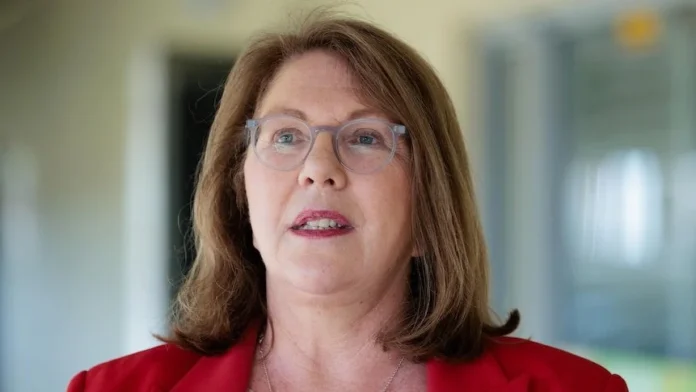Catherine King is an Australian politician who has been serving as the Minister for Infrastructure, Transport, Regional Development, and Local Government since 2022. Additionally, she has been the Member of Parliament for Ballarat since 2001.
Bio/Wiki
Age- 57 years
Height- 1.7 m (approx.)
Weight-65kg(approx.)
Full name-Catherine Fiona King
Born- 2 June 1966
Birthplace-Melbourne, Australia
Spouse-Mark Karlovic
Profession-Politician
Nationality- Australian
Party-Australian Labor Party
Office-Member of the Australian House of Representatives since 2001
Parents
Born in Melbourne on June 2, 1966, Catherine King has not disclosed information about her parents or personal life.
Husband
Catherine King is married to Mark Karlovic, and the couple resides in Ballarat with their teenage son, Ryan.
Mark Karlovic is currently employed at GDF SUEZ Energy Australia, which owns and operates the $92.5 million Canunda Wind project.


Education
Having finished her secondary education at Emmaus College, she went on to earn a Bachelor of Social Work from the Phillip Institute of Technology and a Master of Public Policy from the Australian National University. Later, in 2018, she completed a Bachelor of Laws at Deakin University and was admitted as a lawyer in Victoria in 2021.
Career
Catherine King worked as a social worker at Ballarat Children’s Homes and Family Services from 1988 to 1992. In 1991, she was honored as the Victorian Young Achiever of the Year in community services. During the same year, her six-month stint in Birmingham, England, influenced her decision to enter politics. King later joined the Australian Public Service, working for the Australia New Zealand Food Authority (1993–1994) and the Department of Health and Aged Care (1997–1999). In various roles, including assistant director and director, she contributed to the department’s population health division and led injury prevention efforts. After her public service tenure in Canberra, she returned to Victoria and transitioned to the private sector as a senior manager in KPMG’s consulting division.


Career in Politics
Catherine King joined the Australian Labor Party in 1993, briefly working as a research officer for Andrew Theophanous, the parliamentary secretary for health in the Keating government. She later became the president of the party’s Port Melbourne branch from 1998 to 1999.
A member of Labor Left, King secured her seat in the 2001 election, marking the largest swing to a Labor candidate. She maintained her seat in subsequent federal elections, increasing her majority in 2007 and 2010.
Re-elected in 2010, King served as the Parliamentary Secretary for Health and Ageing and the Parliamentary Secretary for Infrastructure and Transport. In 2013, she became the Minister for Regional Services, Local Communities and Territories, as well as the Minister for Road Safety. Despite the Labor defeat in the 2013 federal election, King retained her seat.
After the 2016 election, she continued as the Shadow Minister for Health. Following the 2019 election, she held the position of Shadow Minister for Infrastructure, Transport, and Regional Development. After the 2022 federal election, King was appointed Minister for Infrastructure, Transport, Regional Development, and Local Government in the Albanese ministry.
Catherine King Net Worth
The net worth of politician Catherine King is estimated to be between $1 million and $5 million.
Latest News about Catherine King
Catherine King Describes Turkish Airlines Expansion as ‘Routine’ Decision, Opening New Market
Despite rejecting a similar proposal from Qatar, the federal government defends its approval of a substantial increase in air rights for Turkish Airlines as a “routine” decision. Catherine King quietly sanctioned Türkiye’s airline capacity to grow from seven to 35 weekly flights by mid-2025, with expanded rights to operate routes between Australia and countries other than Türkiye.
This decision has revived a debate sparked by King’s earlier refusal of Qatar’s proposal for 21 additional weekly flights, which critics argued would have lowered airfares. The government denies favoring Qantas, asserting that the aviation sector is still stabilizing post-COVID-19, and cites a 2020 incident at Doha Airport as a factor in the decision.


A spokeswoman for King acknowledges the ongoing recovery of the aviation sector and emphasizes that the Turkish Airlines expansion will open a new market for Australia.
“Australia and Türkiye share strong cultural, historical and people-to-people links, and aviation plays an important role in supporting these connections,” the spokeswoman said.
“As the minister has said before, capacity is returning and there have been applications such as the ones approved recently, recovery from COVID will take time, and she is taking into account what the sector will look like in the future when making these decisions.”
According to Ms King’s office, Türkiye’s initial approval for seven weekly flights was not utilized because it lacked “fifth freedom rights.” These rights would enable Turkish Airlines to conduct flights that neither originated nor terminated at Turkish airports, including stop-over flights.












































